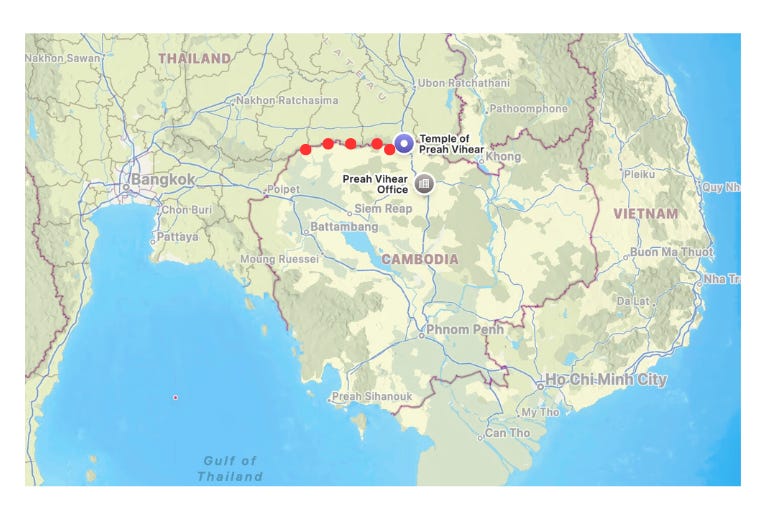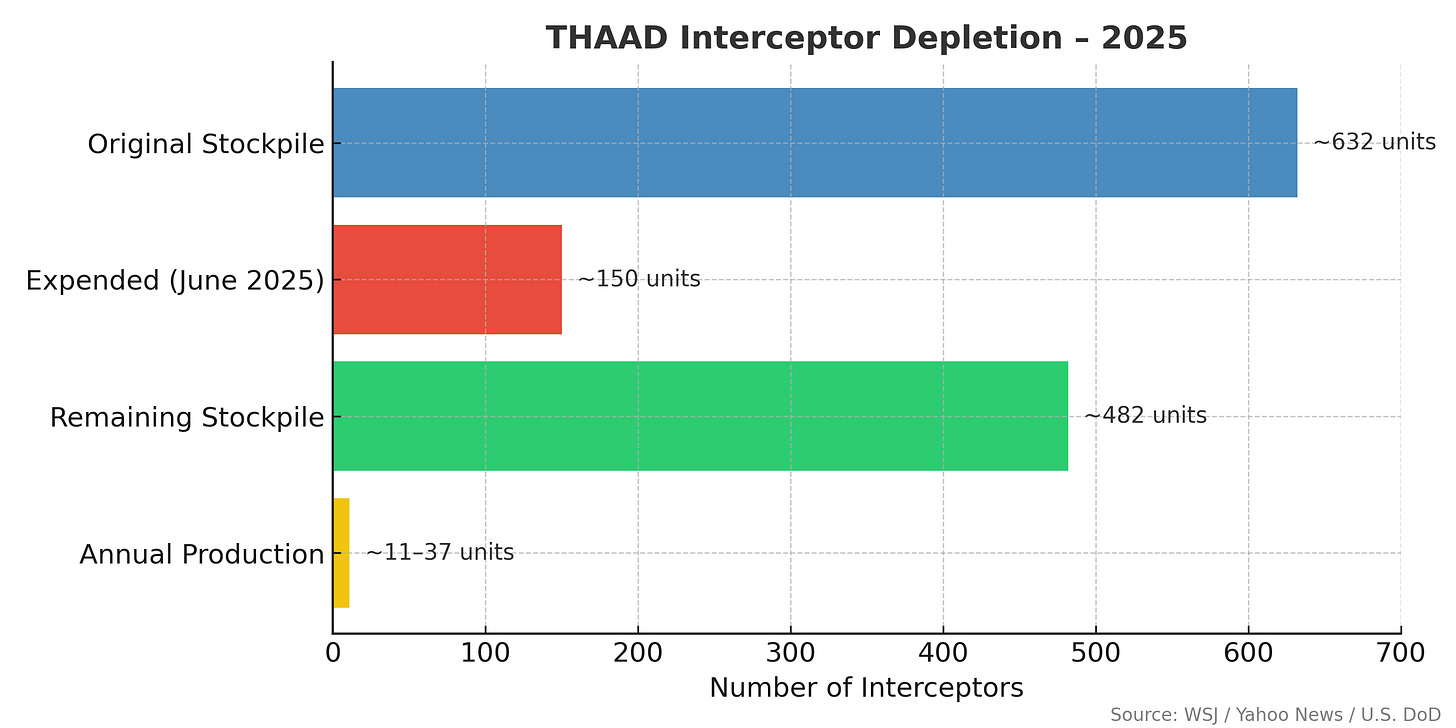10 Things Global News - 28 July 2025
News that matters from around the world
US–EU Strike Compromise Deal to Avert Tariff Escalation
Thailand, Cambodia seek ceasefire
ADF rebels kill dozens in church attack in eastern Congo
Israel to Pause Daily in Gaza Amid Rising Famine Concerns
Wildfires Surge In Greece and Turkey Amid Record Heat
Over 130 million swelter as U.S. heatwave sets records
US Missile Stockpile Strained After Israel-Iran Conflict
US-China Talks Resume - Both Sides Eye Longer Tariff Truce
North Korea rejects Seoul’s outreach
Russia Resumes Direct Flights to North Korea - Closer Ties
The United States and European Union reached a major trade agreement on Sunday, setting a 15% tariff on most EU exports to the U.S. and averting a threatened 30% rate. The deal was finalized during talks between President Trump and European Commission President Ursula von der Leyen at Trump’s Turnberry resort in Scotland. In exchange, the EU will lift tariffs on U.S. goods, commit to $750 billion in American energy purchases, and invest $600 billion into the U.S. economy.
Von der Leyen described the outcome as the “biggest deal ever,” highlighting its importance for predictability and energy security across Europe. The agreement excludes steel, aluminum, and pharmaceuticals, but applies to sectors such as autos, semiconductors, and some industrial goods. It also includes zero-tariff clauses for aircraft parts and specific chemicals. German Chancellor Friedrich Merz welcomed the deal as a way to avoid a damaging trade conflict. Ratification by all 27 EU member states is still required.
Sources: NPR, DW
Leaders of Thailand and Cambodia are meeting in Kuala Lumpur on Monday in urgent talks aimed at halting the worst border clashes between the two countries in over a decade. Acting Thai Prime Minister Phumtham Wechayachai and Cambodian Prime Minister Hun Manet agreed to attend the talks after mediation offers from Malaysia, the United States, and China. More than 30 people have been killed and over 150,000 displaced since fighting erupted on July 24, with artillery exchanges continuing as recently as Monday morning.
Malaysian Prime Minister Anwar Ibrahim is chairing the meeting in his role as ASEAN chair. While Cambodia supports international mediation and calls for an unconditional ceasefire, Thailand insists on bilateral terms linked to troop withdrawal and halting the use of lethal force. U.S. Secretary of State Marco Rubio confirmed American diplomats are on-site to assist, following President Trump’s pressure tactics that included a threat to suspend trade negotiations. The talks remain tense but are viewed as a critical step toward de-escalation.
Sources: Straits Times, Bangkok Post
Suspected Allied Democratic Forces (ADF) fighters launched a deadly assault on a Catholic church in Komanda, eastern Democratic Republic of the Congo, early Sunday, killing at least 34 worshippers, with some reports placing the toll as high as 43. The attack occurred during a prayer vigil and was carried out with guns and machetes, according to local officials and human rights observers. Several houses and shops were also set ablaze, and many residents remain missing.
The ADF, a Ugandan-rooted militant group aligned with the Islamic State since 2019, has repeatedly targeted civilians in eastern Congo. Sunday’s attack follows a string of massacres in Ituri province this month. Security officials say the rebels likely crossed from a nearby stronghold and fled before army reinforcements arrived. A mass grave is being prepared near the church to bury the victims. Civil society leaders condemned the violence and called for immediate military intervention, warning that militants remain active nearby.
Sources: Associated Press, Al Jazeera
Israel has begun implementing a daily 10-hour “tactical pause” in three populated areas of Gaza to allow humanitarian aid deliveries, amid mounting international pressure over worsening hunger. The pause, running from 10 a.m. to 8 p.m. in Gaza City, Deir al-Balah, and al-Mawasi, is intended to increase aid access while military operations continue elsewhere. The decision follows warnings from the UN and global agencies about near-famine conditions, with at least 133 deaths from malnutrition reported, including 87 children.
United Nations officials welcomed the limited easing of access but warned it must be scaled and sustained. Aid convoys from Egypt and Jordan are moving into Gaza, with airdrops and trucks delivering food, though the current volume remains far below humanitarian needs. Civilian deaths continue around distribution points, with more than 1,000 reported killed since May while seeking aid. Ceasefire talks remain stalled, and Israel says its conditions for ending the war include Hamas’ disarmament and exile—terms the group rejects.
Sources: CBS, Le Monde
Firefighters in Greece and Turkey are battling dozens of wildfires intensified by extreme heat, strong winds, and dry conditions. In Greece, five major fronts remain active, including on Evia, Crete, Kythira, and in the Peloponnese. Officials reported power outages, hospitalizations for smoke inhalation, and significant damage to property and farmland. Temperatures reached 42.4°C in central Greece on Sunday, and a blaze on Kythira has reportedly affected 20% of the island. The Greek government has requested EU firefighting aircraft to bolster response.
Meanwhile, Turkey recorded its highest-ever temperature—50.5°C in Silopi—while fires threatened the city of Bursa, prompting the evacuation of over 3,500 people. Two deaths were reported, including a firefighter, and a highway to Ankara was closed. Crews are tackling 84 fires nationwide, with blazes in Karabuk, Kahramanmaras, and Eskisehir claiming multiple lives. Bulgaria, Montenegro, and Albania are also facing serious fire threats, with several disaster zones declared across the Balkans.
Sources: BBC, Associated Press
More than 132 million people across the central and eastern United States are enduring intense heat as a sprawling heat dome pushes temperatures well above seasonal norms. Heat alerts are active in 29 states from Nebraska to Florida and as far north as Massachusetts, with some areas facing heat indexes as high as 115°F. Cities such as Charlotte, New York, Washington, and Atlanta are expected to see consecutive days of extreme heat, with little relief overnight.
In Charlotte, highs hit 101°F, while heat indexes in central Florida and the Carolinas are topping 110°F. PJM Interconnection issued warnings across the Mid-Atlantic and South as power demand surged. Air quality is also deteriorating, with smoke from Canadian wildfires affecting parts of New England. The National Weather Service is urging residents to stay hydrated and avoid outdoor activity. Forecasters expect gradual cooling in northern areas this week, but the Southeast may remain under high heat through the weekend.
Sources: Bloomberg, CBS
The United States expended roughly a quarter of its global THAAD interceptor inventory during the 12-day war between Israel and Iran in June, exposing serious concerns about America’s air defense readiness. US forces deployed two of seven THAAD batteries to support Israel, launching more than 100 interceptors—possibly up to 150—against Iranian ballistic missiles. Despite this large-scale intervention, dozens of missiles still reached Israeli cities, causing damage and civilian casualties.
The Pentagon has acknowledged production shortfalls, with just 12 new THAAD interceptors expected this fiscal year and 37 planned for 2026. Analysts warn that replenishing current stockpiles could take years. The strain is not limited to THAAD; other US systems, including Patriots and SM-3s, were also deployed at unsustainable rates, with naval units forced to withdraw mid-conflict to resupply. Experts and former defense officials say the episode has laid bare the vulnerability of US munitions depth, particularly as parallel risks rise in the Indo-Pacific and Middle East.
Sources: CNN, Islam Times
Top US and Chinese economic officials resumed talks in Stockholm on Monday, with both sides expected to agree on a 90-day extension of their tariff truce, avoiding a return to triple-digit import duties. The talks come as President Trump seeks to stabilize global trade after recent deals with the EU and Japan. While no major breakthrough is expected, officials say a truce extension could ease planning for a Trump–Xi Jinping summit later this year.
The previous 90-day pause, set to expire August 12, followed earlier rounds in Geneva and London and led to a temporary easing of retaliatory tariffs and export controls. Washington has reportedly paused new restrictions on technology exports to avoid derailing negotiations. The Biden-era grievances over China’s trade surplus and state-led industrial model remain unresolved. Analysts say a deal would help reduce US-China tensions, but any longer-term settlement would likely require concessions on tech exports and tariff layers from both sides.
Sources: BBC, Reuters
North Korea has dismissed any possibility of engagement with South Korea, calling Seoul’s recent overtures a “serious miscalculation.” In a statement issued Monday, Kim Yo Jong — sister of North Korean leader Kim Jong Un and a senior ruling party official — said the government of South Korean President Lee Jae-myung had done nothing to warrant trust. She rejected Seoul’s gestures, including halting anti-Pyongyang loudspeaker broadcasts and leaflet campaigns, calling them a mere reversal of hostile acts that “should not have happened in the first place.”
Kim accused Lee’s administration of “spinning a daydream” and described its continued reliance on the US alliance as indistinguishable from previous conservative governments. She reiterated Pyongyang’s position that it has “no interest” in talks. Lee, who took office in June, has pledged to improve relations with the North, but the latest rebuke highlights the depth of mistrust between the two sides, who remain technically at war since 1953.
Sources: Reuters, Al Jazeera
Russia and North Korea have resumed direct commercial flights between Moscow and Pyongyang for the first time in decades, as both countries deepen political and economic cooperation. The inaugural Nordwind Airlines flight landed in the North Korean capital on Monday, carrying primarily North Korean nationals returning home, alongside a Russian delegation led by Ecology Minister Alexander Kozlov. The Boeing 777 aircraft flew through Chinese airspace, marking a rare civilian transit into North Korea.
The Moscow-Pyongyang route will initially operate once a month, with tickets priced at 45,000 rubles. Russia’s transport ministry hailed the move as a milestone in bilateral relations. The flight coincides with Pyongyang’s cautious re-opening to foreign visitors following years of pandemic restrictions, including recent efforts to attract Russian tourists to newly launched resorts like Wonsan Kalma. Russian and North Korean officials are also exploring further links, including a direct flight to Wonsan and a ferry connection.















